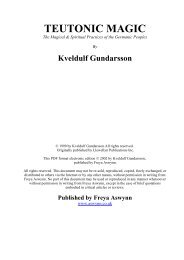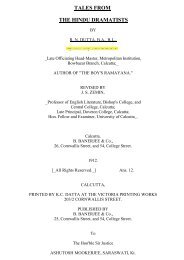Untitled - Awaken Video
Untitled - Awaken Video
Untitled - Awaken Video
Create successful ePaper yourself
Turn your PDF publications into a flip-book with our unique Google optimized e-Paper software.
Chapter 7. At the Well of Urð 174<br />
Ritualistic behavior based on guidelines from the Hávamál, which really is nothing<br />
more than a distillation of Germanic spiritual philosophy can be put into action<br />
by anyone regardless of his or her religious belief system. One could do very well by<br />
himself and others by engaging in such “proper” actions, and through this method<br />
one is acting in accordance with knowledge without having either direct or indirect<br />
access to it.<br />
Common sense is advised by the Hávamál. In my 30 years as an Ásatrú man, I’ve<br />
seen some fairly nonsensical questions raised about the Hávamál. For example, “How<br />
hospitable does an individual need to be?” In this century with its drugs and gangs<br />
and general lack of concern by one man for another, hospitality means something<br />
quite different than it did a mere 30 years ago in the rural community where I grew<br />
up. Hospitality at that time meant that we didn’t lock our doors when we went on<br />
vacation just in case someone might need something from the house. Borrowing and<br />
helping out a neighbor were done as a matter of course. When someone ”broke the<br />
rules” as would happen occasionally, the cold shoulder treatment by the rest of the<br />
community was enough to bring the individual back in line. Now, I live in a town<br />
of 20,000 in the year 2001, and I even lock my car doors. One doesn’t approach<br />
a stranger for news from the outside because 1) it isn’t necessary because we have<br />
cable TV and 2) it’s stupid and dangerous. I’ve seen people try to use the Hávamál<br />
like Christians do the Bible, as a means to justify bad or socially unacceptable<br />
behavior. But in the long run, common sense must prevail. A great man once told<br />
me “Don’t try to split hairs with me! You know when you are acting crappy!” He<br />
was right. When I have to look to the Hávamál to justify why I did something, it<br />
is only because I’m try to justify my selfishness or rudeness; when I am acting out<br />
of “proper action” I never once reach for justification.<br />
There is a phenomenon which has never truly disappeared from humanity, but<br />
which seems to have mushroomed over the last 50 years: the existence of earth-based<br />
religions. The movement has grown and coalesced into the so-called New Age which<br />
is really little more than a “crazy-quilt” built of scraps and pieces taken from all cultures<br />
and sources. Anglo-Europeans are often those who seem to be most affected<br />
by this phenomenon because this are the people who have allowed themselves to<br />
become grossly separated from their cultural spiritual values and, because of this,<br />
many have either joined together with practitioners of non-Anglo-European indigenous<br />
earth-based cultures (those who have not become separated from their ancestral<br />
value systems) or have started new philosophies/ religions. There is much positive to<br />
be said about these groups, way too much for this book, but they lack one thing: a<br />
cohesive ancestral spiritual philosophy which has its base in Anglo-European ancestry,<br />
the ancestral worldview of northern Europe from where most stem. In general,<br />
these people are merely reacting against the Christianity and Christian values that
















